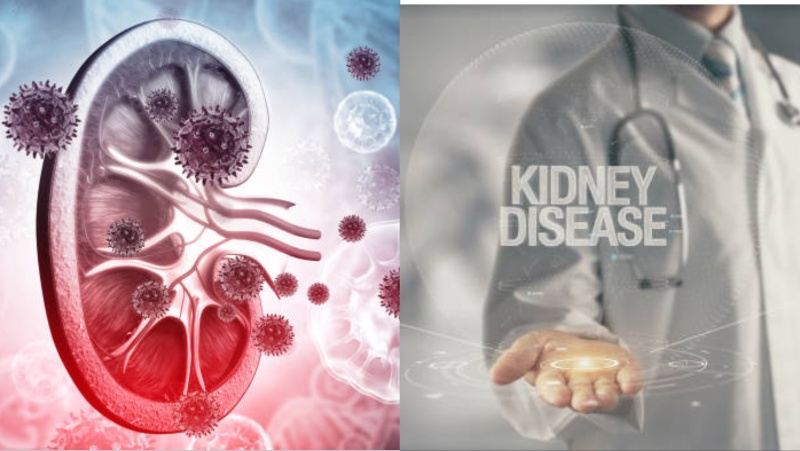Kidney Disease: Symptoms, Diagnosis, Prevention
Kidney disease is a serious health condition that affects millions of people worldwide. It occurs when the kidneys are unable to function properly, leading to a buildup of waste and excess fluid in the body. Early detection and proper management of kidney disease are crucial for a person’s overall well-being. In this article, we will discuss the symptoms, diagnosis, and prevention of kidney disease.
Symptoms of Kidney Disease
Recognizing the symptoms of kidney disease is vital for early detection and treatment. Some common symptoms include:
- Frequent urination: Excessive urination, especially at night, may be a sign of kidney dysfunction.
- Presence of blood in urine: Hematuria, or blood in urine, is a significant indicator of kidney disease. It may appear pink, red, or brown.
- Swelling: Edema or swelling in the hands, feet, and face can occur due to the kidneys’ inability to remove excess fluid from the body.
- Fatigue: Chronic fatigue and weakness are common symptoms of kidney disease.
- Loss of appetite: A decrease in appetite and unexplained weight loss can be a sign of kidney dysfunction.
These symptoms may vary from person to person and can be caused by other underlying health conditions. If you experience any of these symptoms, consult a healthcare professional for an accurate diagnosis.
Read: This Plant Can Help Cleanse the Liver, Kidney, and Body From Toxins
Diagnosing Kidney Disease
To diagnose kidney disease, healthcare professionals use various methods and tests:
- Blood tests: Blood tests, such as the creatinine and blood urea nitrogen (BUN) tests, measure the waste products in the blood to assess kidney function.
- Urinalysis: A urine sample is analyzed to check for the presence of protein, blood, or other abnormalities that may indicate kidney disease.
- Imaging tests: Imaging tests, like ultrasound or CT scan, provide detailed images of the kidneys, allowing healthcare professionals to identify any structural abnormalities or blockages.
- Renal biopsy: In some cases, a small sample of kidney tissue is extracted for microscopic examination to determine the underlying cause of kidney disease.
Early detection through these diagnostic tests is crucial in preventing further damage to the kidneys and initiating appropriate treatment.
Preventing Kidney Disease
While some kidney diseases are hereditary or develop as a result of other health conditions, there are steps individuals can take to reduce the risk of kidney disease:
- Maintain a healthy lifestyle: Eating a balanced diet, engaging in regular physical activity, and avoiding smoking and excessive alcohol consumption can help protect kidney health.
- Stay hydrated: Drinking an adequate amount of water flushes out toxins and helps maintain kidney function.
- Control blood pressure and diabetes: High blood pressure and uncontrolled diabetes are leading causes of kidney disease. Managing these conditions through medication, regular monitoring, and lifestyle changes can significantly reduce the risk.
- Avoid overuse of pain relievers: Overusing pain medications, such as NSAIDs, can damage the kidneys. Always follow the recommended dosage and consult a healthcare professional if needed.
- Regular health check-ups: Annual check-ups can help detect potential kidney problems early on and allow for timely intervention.
- Limit salt intake: Excessive salt consumption can increase blood pressure and strain the kidneys. It is important to limit sodium intake in the diet.
- Exercise regularly: Engaging in regular physical activity can help manage weight, control blood pressure, and promote overall kidney health.
- Avoid smoking and excessive alcohol consumption: Smoking and excessive alcohol intake can damage the kidneys. Quitting smoking and moderating alcohol consumption can reduce the risk of kidney disease.
By adopting these preventive measures, individuals can minimize their risk of developing kidney disease and safeguard their overall health.
Conclusion
Kidney disease can severely impact a person’s quality of life if left undetected and untreated. Recognizing the symptoms and seeking medical attention promptly is crucial. Additionally, individuals should adopt preventive measures, such as maintaining a healthy lifestyle and managing underlying health conditions, to reduce the risk of developing kidney disease. Remember, early diagnosis, and appropriate management can make a significant difference in preserving kidney function and overall well-being.
We encourage you to share your thoughts and experiences related to kidney disease in the comments section below. Together, we can raise awareness and support one another in overcoming this health challenge.
Read: Foods that Cleanse the Liver and Kidneys

















